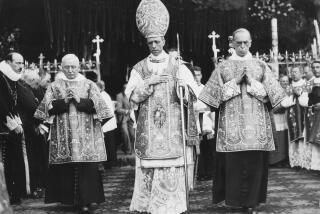Catholic Church in France to Atone for Silence in Nazi Years
- Share via
PARIS — For more than half a century, the Roman Catholic Church has been grappling with its checkered record in France during World War II. When the Nazis and their Vichy allies began rounding up Jews, the French church largely kept silent.
On Tuesday, at the very locale north of Paris where tens of thousands of French Jews were shipped off to their deaths, Catholic bishops will speak out--to atone for the silence of French church leaders during the 1940s.
The document to be read out at the site of the infamous Drancy transit camp north of Paris has yet to be made public, but one participant in the ceremony, Olivier de Berranger, bishop of Saint-Denis, said this week that he and the other clerics will ask forgiveness “for the collective silence of the bishops of France during these terrible years.”
The unprecedented sign of contrition by the French Catholic leadership comes as the country is painfully reassessing the wartime period and the acts of the collaborationist Vichy regime. On Oct. 8, Maurice Papon, a former Vichy official, is to go on trial on charges that he participated in “crimes against humanity.”
The Papon trial in Bordeaux is expected to dramatically document the fact that many of Vichy’s most notorious acts, including its persecution of Jews, were not the fruit of German pressure but the result of decisions freely taken by the French. During the Nazi occupation, about 140,000 people, including 75,000 Jews, were shipped eastward to Nazi death camps.
The church’s wartime role, according to most historians, is largely unheroic. When the first large-scale roundups of Jews began in July 1942, only half a dozen church leaders, including Msgr. Jules-Geraud Saliege, the archbishop of Toulouse, made energetic public protests. The rest of the 76 prelates kept mum. Church leaders also did little or nothing to oppose discriminatory and anti-Semitic decrees promulgated by the Vichy government of the late Marshal Henri Philippe Petain.
“‘We are asking ourselves: Why did they stay silent? Why didn’t they say anything?” said Father Jean Dujardin, secretary of the French bishops’ committee for relations with Judaism.
According to historian Jacques Duquesne, author of a book on French Catholics during the occupation, one reason for the church’s mute acquiescence was its enthusiasm for Vichy’s moralizing, family-based, traditionalist agenda.
Many bishops at the time also were hostile to left-wing and atheistic republicans, who had stripped the French church of much of its property and its domination of the educational system.
Vichy must have appeared to many like a heaven-sent opportunity to redress the balance. “God is at work through you, Monsieur Marshal, to save France,” one monsignor told Petain at the end of 1940.
Tuesday’s declaration is expected to mention those few church figures who spoke out against the atrocities of the time. Other priests helped inspire the Resistance through their writings, and many Christians--individually or in small groups--sheltered Jews, Allied prisoners of war who escaped or members of the Resistance.
Never before, though, have the bishops faced up to the institutional failure of their faith to denounce the anti-Jewish measures of Vichy.
One reason they are acting now is the call made by Pope John Paul II for Christians in all countries to seek reconciliation with other religions subjected to intolerance or persecution over the centuries. The pontiff also hopes for a “purification of memory” as the church prepares for a worldwide jubilee in 2000.
More to Read
Sign up for Essential California
The most important California stories and recommendations in your inbox every morning.
You may occasionally receive promotional content from the Los Angeles Times.













